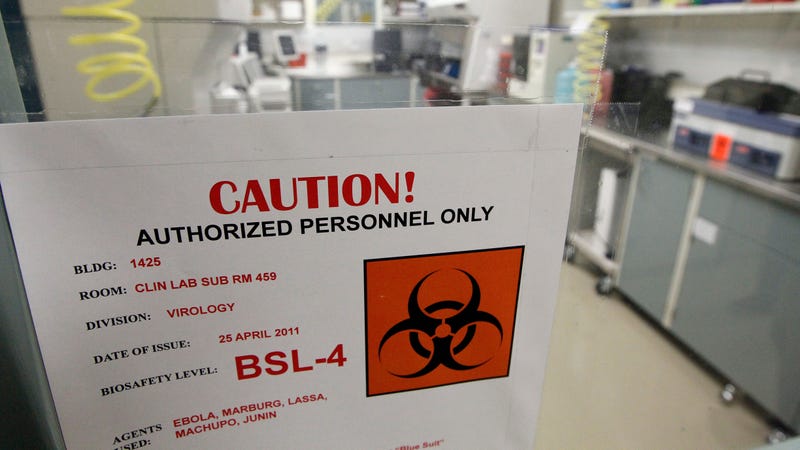
The U.S. Centers for Disease Control and Prevention has shut down a leading military research facility for failing to meet established safety standards, halting important research into some of the world’s most dangerous pathogens and toxins.
Following an inspection in June, the U.S. Centers for Disease Control and Prevention (CDC) issued a cease-and-desist order to the Fort Detrick biodefense lab, reports the Frederick News-Post. All research at the lab, run by the Army Medical Research Institute of Infectious Diseases (USAMRIID), involving a select list of dangerous microbes and toxins is now on hold until further notice.
From 1943 to 1969, Fort Detrick was home to America’s offensive biological weapons program. Today, the Army campus hosts several institutions, including USAMRIID, which conducts public and private research into some of the world’s most dangerous pathogens and toxins, including Ebola, anthrax, and the bacteria responsible for the plague.
Following the June inspection, the CDC found “several areas of concern in standard operating procedures,” the Frederick News-Post reported. Among the problems cited, the facility failed to have systems sufficiently capable of decontaminating wastewater, it lacked “periodic recertification training for workers in the biocontainment laboratories,” and it failed to meet standards established by the Federal Select Agent Program, among other deficiencies, Caree Vander Linden, a spokesperson for USAMRIID, told the Frederick News-Post. The CDC could not provide more specific details for “national security reasons,” the New York Times reported.
Importantly, no dangerous pathogens or toxins escaped from the facility, and the public was never in any danger, according to Vander Linden.
Speaking to the NYT, Vander Linden said it could be “months” before the bio-defense program is able to restart operations, during which time the USAMRIID will work to meet the CDC’s requirements in order to have the suspension lifted. The cease-and-desist order meant that the USAMRIID’s registration with the Federal Select Agent Program was invalid, and that without the proper authorization to possess and handle dangerous pathogens and materials, all research at the facility had to stop. That said, USAMRIID can still offer its expertise in the event of an outbreak or contamination.
“The Federal Select Agent Program oversees the possession, use and transfer of biological select agents and toxins, which have the potential to pose a severe threat to public, animal or plant health or to animal or plant products,” according to the CDC’s corresponding website. Normally, the USAMRIID is authorized to handle these super-dangerous “select agents,” of which the CDC currently identifies 67, including SARS, botulinum, anthrax, and ricin.
As the Frederick News-Post reported, the USAMRIID facility at Fort Detrick was investigating three of these top-tier agents when it got the cease-and-desist order: the Ebola virus, Yersinia pestis (the bacterium responsible for the plague), and Francisella tularensis (the bacterium responsible for tularemia, also known as deer fly fever and rabbit fever).
In May 2018, storms caused a flood at the Fort Detrick facility, seriously damaging its 10-year-old steam sterilization plant, which provides high-tech wastewater management. The plant was offline for months, and the incident resulted in upgraded biosafety procedures. But as Vander Linden told the Frederick News-Post, the new protocols significantly increased “operational complexity” at the facility. The CDC inspection found that the “new procedures were not being followed consistently,” along with the discovery of “mechanical problems with the chemical-based decontamination system, as well as leaks [inside the lab],” the New York Times reported.
It’s not great that a leading laboratory is now out of commission (hopefully only temporarily), but it’s good that the Centers for Disease Control and Prevention is a stickler for safety; the organization is certainly living up to its name. Any operation that handles agents like anthrax clearly needs a robust system of checks and balances.
